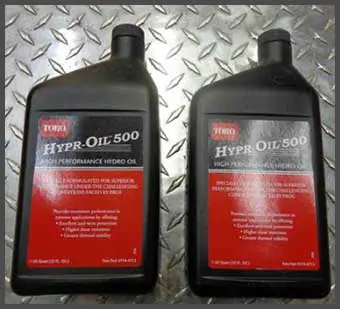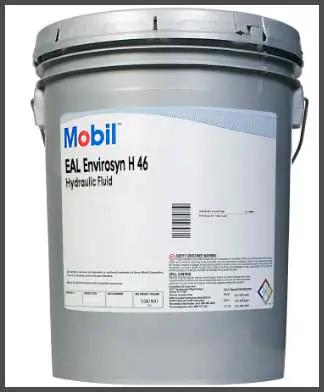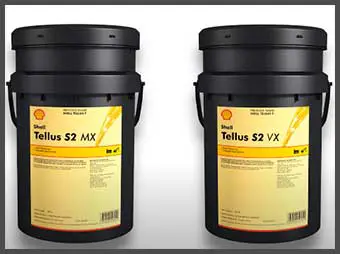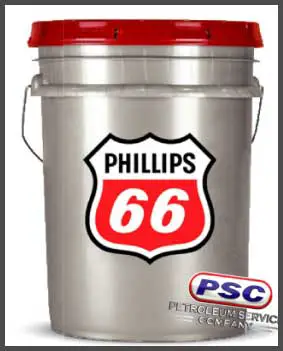As the owner of any piece of equipment that relies on hydraulics to operate – whether that’s a rider mower for meticulously keeping acreage grounds or a compact utility loader for indoor construction sites – having the right hydraulic fluid is crucial. It’s what gives the entire system its vitality and performance.
For Toro’s extensive line of commercial and residential landscape equipment outfitted with hydrostatic transmissions, that optimum fluid is Toro’s HYPR-OIL 500 premium hydraulic oil. But what if that specific formulation isn’t available when you need to top-up or change fluid?

Or if the cost of genuine Toro HYPR-OIL 500 puts it out of reach for maintenance routines?
You’ll need to find an acceptable substitute that offers comparable performance and protection for critical components like transmissions, pumps, motors and cylinders while matching Toro’s specifications.
Easier said than done when dealing with sensitive hydraulics that have tight tolerances and operating regiments!
Not to worry – this guide will explore all your options for alternate hydraulic fluids if Toro HYPR-OIL 500 becomes difficult to source or too expensive to keep relying on.
I’ll overview the top contenders that can work as substitutes, discussing the pros and cons of each to help determine what best fits your Toro equipment and maintenance needs.
Evaluating Alternatives To Toro HYPR-OIL 500
When Toro HYPR-OIL 500 isn’t available, these are top hydraulic fluid substitutes to consider for your Toro commercial and residential mowers, utility vehicles and construction equipment:
- Mobil EAL Envirosyn H Series
- Chevron Hydraulic Oil AW
- Castrol Bio Universal
- Shell Tellus S2 MX
- Phillips 66 Hydraulic Oil AW
- Cam2 Pro Max Hydro Toro
Let’s talk about these alternatives in detail.
Mobil EAL Envirosyn H Series
The Mobil EAL Envirosyn H line is a high-tech, eco-friendly fluid range made of fully synthetic esters for maximum biodegradability with low toxicity. It’s designed specifically for challenging hydraulic applications like hydrostatic transmissions in mobile off-highway equipment.
Pros

- Low pour points excel in cold temperatures
- Ultra shear stability resists viscosity loss
- Superior detergency keeps systems cleaner
- Eco-friendly ester base fluid biodegrades rapidly
Cons
- Very expensive per gallon
In terms of matching Toro’s rigorous performance specs, Mobil EAL Envirosyn H is the closest fit as a premium synthetic transmission hydraulic fluid.
It offers superb protection for hydrostatic gear systems under heavy loads, contamination, variable speeds and operating temperatures.
Downside is the premium synthetic EAL fluid comes at a steep price – often double or more the cost of standard hydraulic oils.
But you get what you pay for – this is the Cadillac of transmission hydraulic fluids outside Toro’s own.
Consider Mobil EAL Envirosyn H if you want extreme high performance with strong eco-credentials as a biodegradable fluid. Just be prepared to pay for the privilege!
Chevron Hydraulic Oil AW
Chevron Hydraulic Oils AW are mineral oil-based anti-wear hydraulic fluids, ranging from ISO 32 to ISO 68 grades. They’re designed to offer reliable protection, performance consistency and long fluid life at a moderate price across a spectrum of hydraulic systems.
Pros
- Proven wear prevention
- Handles pressure spikes
- Good viscosity range options
- Compatible with seals & hoses
Cons
- Not tailored specifically for transmissions
Chevron Hydraulic Oil AW is a solid, general purpose anti-wear hydraulic fluid ideal for off-highway equipment operating in normal service conditions. It offers good value protection at moderate pricing that slots in below premium hydraulic oils but above basic fluids.
The Chevron Hydraulic Oil AW grades make a decent substitute candidate for Toro HYPR-OIL 500 in a pinch if you closely match viscosity and performance specs – and your machine maintenance is fairly light duty. Being non-synthetic, its lubricating abilities aren’t quite as advanced as genuine Toro fluids though.
Shell Tellus S2 MX
Shell Tellus S2 MX represents the pinnacle of Shell lubricants innovation – an elite synthetic hydraulic fluid family that delivers uncompromised protection for critical components under arduous conditions. It’s formulated for long life and system efficiency without environmental trade-offs.
Pros

- Handles temperature extremes
- High shear stability
- Resists oxidation and acid build-up
- Protects against rust & corrosion
- Compatible across seal materials
Cons
- Very expensive per gallon
Shell Tellus S2 MX is in the same top tier bracket as Mobil EAL Envirosyn when it comes to premium performance and price.
This synthetic hydraulic range is overqualified for many standard hydraulic power uses, but its advanced additive technology offers enticing lubrication capabilities if you want extreme protection for demanding hydraulic systems.
Cost factor is the biggest impediment to using Shell Tellus S2 MX routinely – you can easily pay double or more the price of Toro HYPR-OIL 500. But if you want one of the world’s highest quality hydraulic fluids shielding your Toro transmissions, Tellus S2 MX is in the conversation.
Castrol Bio Universal
Castrol Bio Universal is one of the world’s first hydraulic fluids made partially from renewable plant-based resources to deliver high performance with much greater environmental sustainability. Around 20% of its make-up comes from rapeseed oil.
Pros
- Ultra-low toxicity if leaks
- Rapid biodegradation rate
- Certified carbon neutral footprint
- Matches petroleum fluid performance
Cons
- Triple the price of standard fluids
If your landscape equipment operations prioritize eco-friendly credentials, Bio Universal deserves a close look as an environmentally conscious substitute for Toro transmissions and hydraulics. Its unique vegetable oil base fluid achieves impressive sustainability targets without compromising hydraulic system protection abilities.
Being three times more expensive than conventional mineral oils keeps overall running costs high though. Castrol Bio Universal makes most sense for commercial operators invested in maximizing green principles across their fleet.
Also Read: Yamaha Tilt Trim Fluid Competitors.
Phillips 66 Hydraulic Oil AW
Phillips 66 Hydraulic Oils AW are budget-friendly anti-wear hydraulic fluids intended for standard stationary and mobile hydraulic system applications – not specialized transmission duties like Toro’s. But they offer reliable protection when operating conditions aren’t overly demanding.
Pros

- Most affordable price tier
- Good viscosity range choices
- Meets minimum anti-wear standards
- Acceptable oxidation resistance
Cons
- Much lower performance ceilings
- Shorter fluid life than premium oils
Due to more basic formulations focused on affordability over performance extremes, Phillips 66 HO AW fluids cap out at moderate protection abilities and fluid change intervals compared to Toro HYPR-OIL 500.
But for lighter household mowing use or seasonal commercial landscaping fleet duties, they offer “good enough” shielding for hydraulics at the most attractive per-gallon pricing among major hydraulic oil brands, while carrying major manufacturer approvals.
Cam2 Pro Max Hydro Toro
A niche player in the hydraulic fluid space, Cam2 offers its Pro Max Hydro Toro premium hydraulic oil range specifically designed to meet or exceed Toro’s HYPR-OIL 500 performance specifications – at around half the price.
Pros
- Formulated for Toro compatibility
- Fuels savings from efficiency
- Handles high pressures
- Detergents maintain cleaner systems
Cons
- Obscure branding lacks renown
- Limited real world testing evidence
This lesser known hydraulic oil brand boldly claims it matches the factory-fill standards and protection abilities of Toro’s own HYPR-OIL 500 fluid across wear prevention, oxidation resistance and hydraulic system component integrity – at substantial cost savings.
Questions remain around real world evidence backing up those performance assertions. But if the hydraulic fluid chemistry and lubricity metrics directly align with Toro factory fill, Cam2’s fluid ranges are intriguing hydraulic oil substitutes that cost considerably less than most premium offerings.
Key Takeaways on Toro HYPR-OIL 500 Substitutes
Hopefully this wide lens view of potential replacement options for Toro HYPR-OIL 500 gives you increased clarity around alternatives that best align with your equipment performance requirements and maintenance budget.
Key guidance points to remember:
- Closely match viscosity grades and specifications for optimal interchangeability
- Seek hydraulic oils engineered specifically for hydrostatic transmissions whenever possible
- Heavier duty operations need pricier premium hydraulic fluids to maintain protection
- Consider eco-friendly synthetic fluids if environmental performance is paramount
- More affordable hydraulic oils work sufficiently for less intensive consumer use
And if questions remain around the ideal hydraulic system protection plan for your landscape fleet, don’t hesitate to use our contact form to tap into Cam2’s lubrication expertise!
Also Read: J20D Hydraulic Fluid Competitors.
FAQ on Toro Hydraulic Fluid Specs
To close out this guide, here’s more detail around Toro equipment hydraulic fluid technical specifications in case you need to cross-reference fluids mentioned above or confirm alternate hydraulic oil grades:
Toro HYPR-OIL 500 hydraulic fluid has an ISO 46 anti-wear hydraulic oil viscosity grade with operating temperatures ranging around -26°C to 98°C when used in Toro hydrostatic transmissions.
Any hydraulic fluid substitutes should fall within a +/- one viscosity grade to best match system specifications – so ISO 32, 46 or 68 grades that show hydrostatic transmission approval meet the viscosity criteria.
Toro also offers HYPR-OIL 600 for certain products, which is an ISO 68 hydraulic oil grade.
Most major Toro commercial and residential mowers, compact utility loaders, trenchers and turf renovation equipment with hydrostatic transmissions use Toro’s specially formulated HYPR-OIL 500 hydraulic fluid as factory fill during manufacturing.
But some entry residential products may allow regular ISO 46 hydraulic oils since hydraulic system pressures and stress factors are lower. Always consult specific operator’s manuals to confirm approved fluids for your Toro landscape machine.
Unlike diesel-powered Toro Dingo compact utility loaders requiring HYPR-OIL 500 for their hydraulic reservoirs, gasoline-powered Dingo models use the engine’s motor oil for their hydrostatic drive systems in order to simplify maintenance.
So gasoline Dingos filled from the factory with standard 10W-30 or 5W-30 conventional motor oils don’t need HYPR-OIL 500 substitutes – just stick with the same viscosity grade engine oil during fluid changes.
While Toro doesn’t explicitly void warranties if non-OEM fluids are used in their landscape equipment, they do “highly recommend” factory-fill fluids like HYPR-OIL 500 or approved substitutions to “best protect Toro products and maximize performance.”
So while you can get away with substitute hydraulic oils, Toro hints that equipment issues arising later related to inferior fluid performance likely won’t be covered by warranty terms. Stick to prescribed factory fluids when possible.
Closing Remarks
Hopefully these further Toro hydraulic fluid usage details help reinforce the optimal fluid options uncovered above for keeping your landscape equipment’s demanding hydrostatic systems performing reliably long term.
Let me know if any other substitution questions come up!

